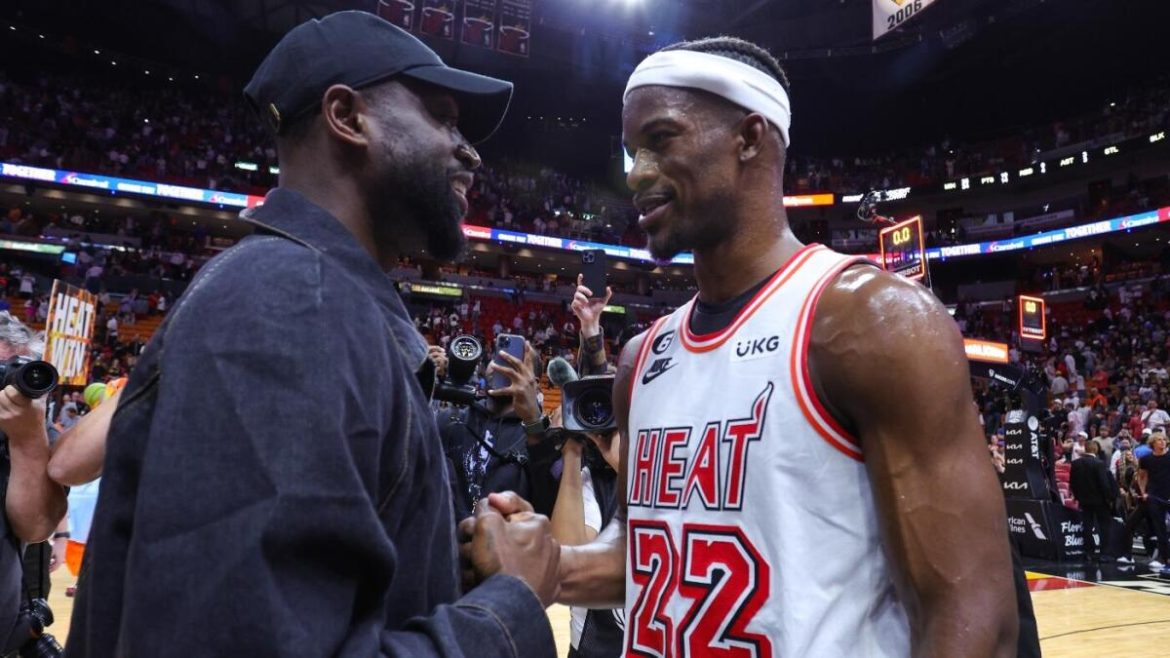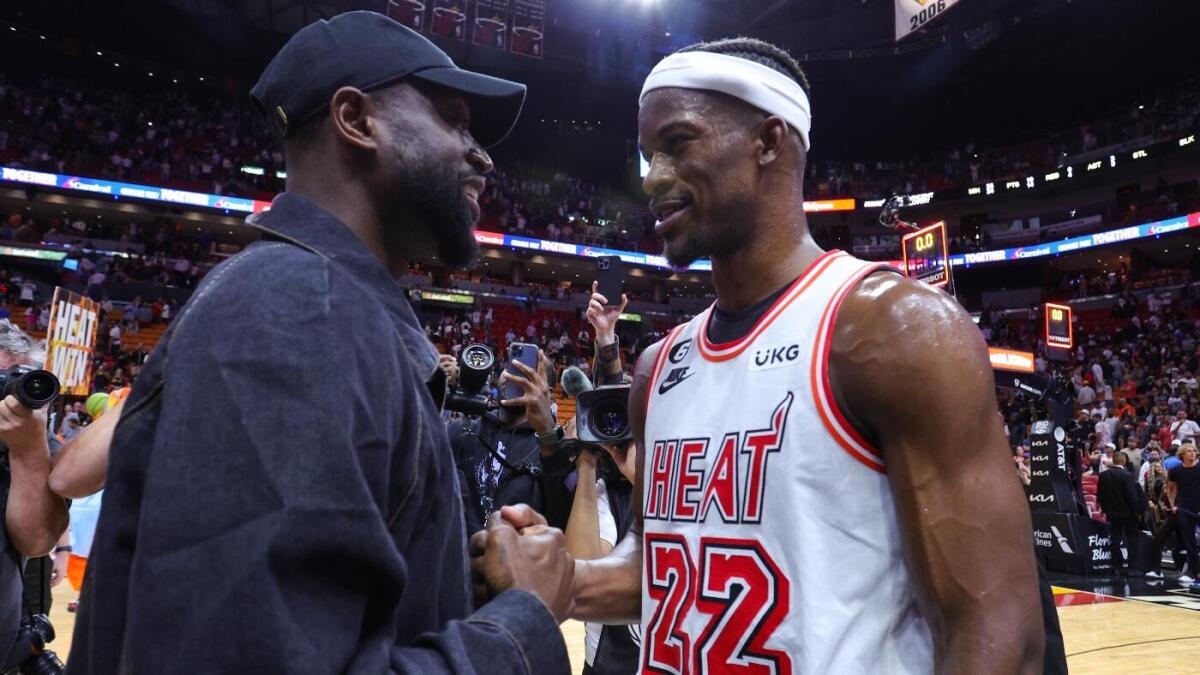Dwyane Wade’s Candid Critique of Jimmy Butler’s Playoff Performance: A Deeper Look
Introduction: The Weight of Expectation on a Playoff Star
Jimmy Butler, known for his tenacity and leadership, recently faced sharp criticism from NBA legend Dwyane Wade, particularly regarding Butler’s performance during the Golden State Warriors’ playoff series against the Minnesota Timberwolves. Wade, once Butler’s teammate with the Miami Heat, offered blunt assessments that have ignited conversations across the basketball world. This report explores Wade’s commentary, the context surrounding Butler’s playoff struggles, and the broader implications for both players’ legacies and team dynamics.
Wade’s Criticism: “He Wouldn’t Look at the Basket”
Wade’s primary critique centered on Butler’s apparent lack of aggressiveness and reluctance to take control in crucial moments. During a podcast episode recorded amid the Warriors’ playoff exit, Wade remarked, “He wouldn’t look at the basket,” drawing parallels between Butler’s recent play and past performances he witnessed firsthand while both were with the Heat.
This phrase encapsulates Wade’s disappointment with Butler’s approach, especially in Game 4 of the series where Butler scored only modestly despite playing heavy minutes. Wade suggested that Butler, known for his “pass-first” style and desire to get teammates involved, needed to shift gears and take a more selfish, assertive role when the stakes demanded it. Wade’s critique highlights an important tension in Butler’s game: balancing team playmaking with the necessity of confidence and aggression in playoff situations.
Historical Context: Butler and Wade’s Shared Miami Heat Experience
Their relationship provides critical coloring to Wade’s comments. Both players served as the Heat’s backbone during their respective peaks, with Butler often compared to Wade for his relentless competitiveness and leadership style. On various occasions, Butler has publicly acknowledged Wade’s mentorship, noting that “he’s constantly in my ear,” offering guidance not only about basketball but also about life and family values.
However, friction also arose during Butler’s tenure in Miami. Offcourt incidents and disputes over leadership style surfaced at times, occasionally creating tension in the locker room. Wade’s pointed remarks about Butler’s playoff demeanor evoke these complex dynamics — a blend of mentorship, frustration, and high expectations born from their shared history.
The Warriors’ Playoff Context: Stepping Up Without Stephen Curry
The Golden State Warriors, traditionally led by Stephen Curry, entered the playoffs without their star point guard due to injury. This absence thrust Butler into a greater leadership and scoring role. Unfortunately, his subdued shooting and shot attempts—reportedly taking only 11 shots in about 42 minutes during a critical Game 5—reflected a lack of the usual “Playoff Jimmy” assertiveness fans and analysts have praised in the past.
Wade’s critique underlines how Butler’s hesitancy contributed to the Warriors’ series loss, a disappointing outcome given their early 1-0 lead against the Timberwolves. This disappointment intensified scrutiny over whether Butler could truly carry a team through the playoffs without a dominant co-star.
Butler’s Playoff Reputation: “Playoff Jimmy” and the Duality of Perception
Butler’s playoff reputation is complex and nuanced. He has earned the nickname “Playoff Jimmy” for his historic performances, notably with the Miami Heat during deep postseason runs, where his scoring, defense, and leadership were pivotal. Highlights include his starring role in Game 6 against the Celtics in 2022, inspired in part by Wade’s encouragement, which showcased his ability to elevate his game under pressure.
Yet, Butler’s recent struggles with the Warriors contrast with this image, opening debates about the sustainability of his excellence as he ages and changes teams. Critics point to moments where he seems too cautious or deferential; supporters remind fans that pushing a team through playoffs is a team effort, especially when primary scorers like Curry are absent.
Wade’s Leadership Voice: Balancing Criticism and Support
Dwyane Wade’s critiques stem not just from an observer’s standpoint but from that of a former teammate, mentor, and fellow competitor. His insistence that Butler needed to “do something” during key moments reflects a desire to see Butler fulfill his potential as a top-tier NBA leader.
Wade also recognizes Butler’s strengths and previous successes, acknowledging his pass-first mentality and team spirit. The criticism is more of a challenge than condemnation, a call for Butler to return to his more assertive playoff form. This dynamic mirrors the intricate relationship between mentorship and honest feedback in professional sports.
Broader Implications: Legacy, Franchise, and Future Directions
Wade has expressed that Butler’s departure from the Heat and subsequent playoff struggles have left a “stain” on the franchise’s narrative. The “tragedy” Wade refers to appears to be rooted in how the Heat-Butler relationship unraveled, compounded by Butler’s fluctuating performances after moving on.
This situation raises questions about player development, leadership communication, and team chemistry. For Butler, it may signal the need to reassert his dominance and adjust his game strategy under new circumstances. For Wade, the role of a veteran voice remains vital as he navigates public commentary on rising and declining stars.
Conclusion: The Ongoing Dialogue Between Two Heat Legends
Dwyane Wade’s forthright critique of Jimmy Butler’s recent playoff showing is a testament to the high standards imposed on elite athletes, especially those linked by history and expectation. The dialogue between Wade’s mentorship and blunt assessment, and Butler’s response and resilience, offers a compelling narrative about legacy, leadership, and the relentless pursuit of excellence in the NBA.
As fans and analysts watch Butler’s next moves, Wade’s words serve both as a reminder of the intoxicating pressure of playoff success and an invitation for Butler to reclaim his role as the assertive, fearless leader the league once celebrated. Beyond the criticism lies the shared understanding of what it means to chase greatness—and the hard truths that come with that pursuit.





